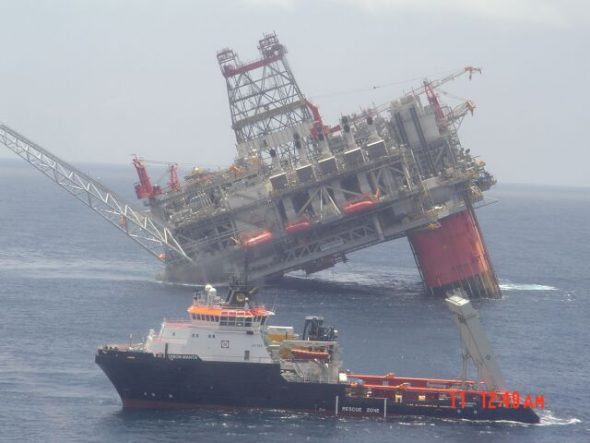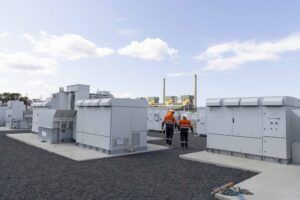Australia, along with the rest of the world’s nations, has formally adopted the objective of restraining global average temperatures to no more than two degrees Celsius (2°C) above pre-industrial levels. The 2°C goal is a proxy for avoiding dangerous and irreversible changes to the world’s climate — an outcome that the vast majority of Australians support.
Even a 2°C average temperature rise would worsen climate change impacts that are already being felt across Australia. Yet the world’s breakneck growth in fossil fuel supply and consumption is causing greenhouse gas emissions to rise at such a rate that, as the International Energy Agency warned this year, “the door to a 2°C trajectory is about to close”.
To keep the door open, global emissions must peak and begin to decline by 2020 at the absolute latest and then keep declining to zero by between 2040 and 2050. We are in “the critical decade.” Decisions we make today will largely determine the state of the climate system within which all subsequent generations must live.
The world’s nations gathered in Durban in late 2011 to continue long-standing negotiations towards a comprehensive international treaty to cut greenhouse gas emissions. The best they could agree was that they would aim to negotiate by 2015 an agreement requiring some countries to start reducing emissions beginning in 2020. These negotiations cannot be relied upon to secure the emissions cuts that are required. “It is clear”, argue the editors of the world’s preeminent scientific journal, Nature, “that the science of climate change and the politics of climate change … now inhabit parallel worlds”.
Australia, too, is operating in a parallel world. Having introduced a carbon price that it claims will usher in a “Clean Energy Future,” the federal government and its state government counterparts are aggressively supporting a massive program of investment in new mines, wells, pipes and ports. These projects will see Australia export a staggering amount of highly emissions-intensive coal and gas during – and well beyond – the critical decade.
Australia is already the world’s largest coal exporter, responsible for more than a quarter of the world’s traded coal, and is the fastest growing exporter of liquefied natural gas. The emissions embodied in Australia’s fossil fuel exports already total much more than our “domestic” emissions. Based on data accumulated by Australian government agencies, Australia’s combined coal and gas exports are projected to more than double between now and 2030.
To allow this to occur would be catastrophic for global efforts to avoid dangerous climate change: it would mean Australia would be causing more than 1 in every 10 tonnes of the greenhouse gas emissions that can be emitted into the atmosphere in 2030 consistent with a 2°C warming trajectory.
Australia is the steward of its natural resources. They belong to all Australians and we can choose what to do with them. When our exports of coal and gas are burned, the carbon dioxide released into the atmosphere is the product of these choices. The fact that these emissions are not counted in Australia’s “carbon accounts” under UN carbon accounting rules has previously been used as an excuse for us to ignore their consequences.
But these rules are based on the idea that all countries will have emissions reduction targets, the achievement of which will “add up” to the global cuts necessary to stay within the 2°C limit. With the UN negotiations deadlocked and no foreseeable prospect of such an international regime emerging in the necessary time frame, this excuse is not acceptable.
Hoping, against all probability, that the negotiations will reach a breakthrough just in time, while at the same time making the problem they are trying to solve significantly worse is a dangerous, counterintuitive and counterproductive approach for Australia to take.
It is well beyond time to approach the global challenge of preserving a safe climate in a very different way. It is time to put leadership towards zero carbon prosperity at the heart of our response.
In this report, Beyond Zero Emissions proposes a new way forward: a practical, problem-solving approach to the decarbonisation of the global economy within the timeframe necessary to preserve a safe climate — driven by national leadership and accelerated through international cooperation.
The logic of “Cooperative Decarbonisation” is simple. Each country must phase down to zero or very near zero the greenhouse gas emissions associated with every economic and social process over which it has control or influence. Instead of drawing lines at national borders, this approach recognises that, in a globalised economy, countries have shared responsibility for many of the emissions that occur in any one place. As such, countries should use every lever they have to eliminate those emissions within their “sphere of influence”, including the fossil fuels they export and the goods they import.
Clearly, international cooperation will be required — particularly to ensure that the goals of sustainable economic development are achieved and that wealthier countries assist low-income countries to make this essential transition. But instead of trying to do it all in one “grand bargain” as they are today, countries should work in smaller groups, focusing their efforts on the individual sectors and processes that cause emissions – working to leave fossil fuels in the ground, preserve the world’s forests and make renewable energy affordable for all.
Australia, one of the world’s wealthiest nations, is one of only a small handful of countries that can lead this process. The main reason for this is simple: our sphere of influence over global emissions is immense. Our high domestic emissions make us an important player, on par with nations like France, Spain and South Korea. But it is our ballooning coal and gas exports that make us a truly critical influence on global emissions.
We can use this position to focus the attention of world leaders on the most important, yet least discussed part of the climate problem: the fact that only one-eighth of the world’s remaining fossil fuel reserves can safely be burned. Australia can help make that which is currently “unthinkable” – a global fossil fuel phase out – a reality. We propose an Australian moratorium on new fossil fuel developments: a bold move from the world’s largest coal exporter that can serve as the centrepiece for a wider call to action. Such a move would maintain the current global price of coal and stop it from falling by an expected 30 per cent this decade. It would be one of the few conceivable ways that any single country could jolt world leaders into action, creating the economic and political momentum to commence immediate global discussion on the best and fairest means to phase-out fossil fuels.
Thankfully, Australia’s global power does not arise only from our ownership of the resources that are fuelling the problem. As the beneficiary of world-class solar and wind resources, we also hold the key to the most important solutions.
Solar photovoltaics (PV) and wind energy are essential to decarbonising the world’s energy system. Thanks largely to the targeted investments made by Germany and other European countries when these technologies were more expensive, they have sailed down the “cost curve” and are now price-competitive with fossil fuel energy in many markets. Germany’s installation of almost 30GW of solar PV brought PV prices down by an incredible 65 per cent over the past six years.
The other crucial technology is concentrating solar thermal (CST) with storage. This technology, which is operating today in other countries, produces 24 hour energy from the power of the sun. The Zero Carbon Australia Stationary Energy Plan showed that powering the Australian economy using predominantly CST is technically and economically achievable, starting now, in ten years. The greatest gift that sunny Australia could give to the world is to repeat for CST what cloudy Germany did for solar PV: through smart policies and targeted investments, enable the deployment across Australia of enough CST to make this game-changing technology cost-competitive with fossil fuels everywhere.
Cheap renewable energy will solve some of the most challenging problems facing humankind this century – from climate change, to oil scarcity, to energy poverty – and allow us to build a global economy on foundations as reliable as the rising sun.
Australia has the power to make it happen.
Fergus Green is the Chairman of the Centre for Sustainability Leadership and a 2012 General Sir John Monash Scholar to the London School of Economics. Reuben Finighan is the 2012 Fulbright Scholar and 2012 Frank Knox Scholar at the Harvard Kennedy School of Government. This piece is an extract from the report Laggard to Leader: How Australia Can Lead the World to Zero Carbon Prosperity released on Mnday by Beyond Zero Emissions.








